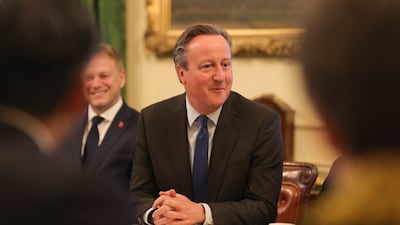Live updates: Follow the latest news on Israel-Gaza
David Cameron, the former UK prime minister who has taken up the role of Foreign Secretary, has entered a very different environment than the one he left seven years ago, facing a world riven by grave foreign policy issues.
Foremost among the questions he will be asked is whether he can deliver a Middle East-heavy policy as the region teeters on the edge of catastrophe amid the Israel-Gaza war.
In a signal of Mr Cameron's intent, on his first day in office in a co-ordinated move with the US, he imposed a round of sanctions on the Hamas leadership.
The package of travel bans, asset freezes and arms embargoes are aimed at six people including Yahya Sinwar, Hamas’s political leader, and Mohammed Deif, its military commander.
“We will continue to use every tool at our disposal to disrupt the abhorrent activity of this terrorist organisation making it harder for them to operate and isolating them on the world stage,” Mr Cameron said in a statement.
“The Palestinian people are victims of Hamas, too. We stand in solidarity with them and will continue to support humanitarian pauses to allow significantly more life-saving aid to reach Gaza.”
The stringent measures have been placed on the Hamas leadership to “disrupt the group’s acts of terror”, the statement added.
If Mr Cameron is to help in the Middle East, then he is starting with the advantage: he is personally known to key leaders in the region, including Israel’s Benjamin Netanyahu and Mahmoud Abbas of the Palestinian Authority.
The British government’s hardening language around the humanitarian pause and aid to Gaza will be immediate objectives for the new Foreign Secretary to pursue and one that analysts believe he is well equipped to tackle.
Prime Minister Rishi Sunak said on Monday evening that Britain had doubled its aid to Gaza while pressing Israel directly “for unhindered humanitarian access and urgent and substantive humanitarian pauses” with “aid coming in by land, air and sea”.
“Crucially David Cameron has the right standing with Israelis but also, he's balanced that out with a good relationship with key Middle Eastern states, particularly in the Gulf,” said Shayan Talabany, a senior analyst at the Tony Blair Institute.
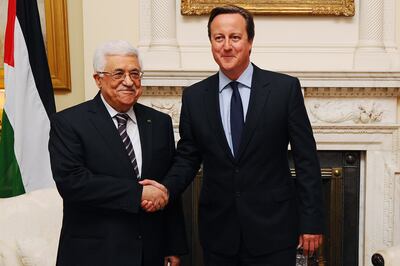
That Mr Cameron has previously labelled Gaza a “prison camp” and appealed to the Israelis to allow the flow of goods and people into and out of the enclave will also play in his favour.
But critically, while prime minister, he was pro-Israel while also speaking out against anti-Semitism – “and a friend that will sometimes speak out against things that he sees, is critical”, said Ms Talabany.
Robin Gordon-Farleigh, Mr Cameron’s former communications strategist, told The National that his ex-boss’s extensive experience in the Middle East would be an advantage.
“That and his established close relationships with leaders in the region will make his approach as Foreign Secretary both informed and strategic,” he said.
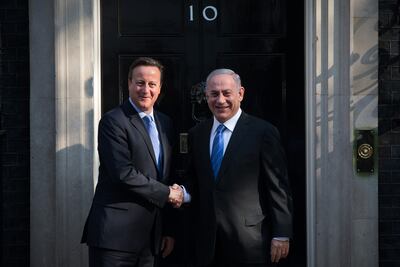
Mr Cameron’s long-standing relationships with many countries will also be “a real asset” for Britain in dealing with key global issues, said Mr Gordon-Farleigh, founding partner of Manara Global, a UAE-based strategic communications agency.
“His grasp of international relations and the existing relationships he has with leaders should mean that Britain can make some serious advances in its foreign policy agenda in which David Cameron will be more ambitious in what can be achieved.”
That ambition will be significantly tested in the coming weeks as he flies out to conflict zones that will certainly include Israel and Ukraine.
But there are some who argue that his Middle East foreign policy failures from his time in office from 2010 to 2016 are not redolent of success.
Jeremy Black, a foreign policy commentator, argued that Mr Cameron was “too much of a lightweight” to make any significant impact, pointing to his foreign policy failures in Libya and Syria as well as Brexit.
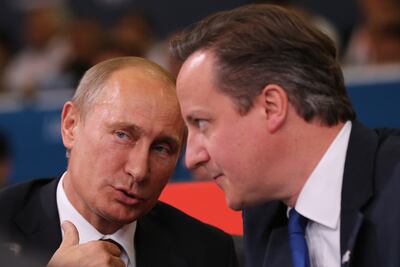
“I don't think he ended his period in office having the respect of international leaders,” he said. “So I'm not sure that he can deliver very much while Britain is trying to claim an international role which it doesn't really have.”
He added that in his seven years out of frontline politics, Mr Cameron had not made any “keynote lectures of great consequence” outlining his foreign policy vision.
To a lesser extent, that view is shared by the former Iranian state hostage Ana Diamond, who said that her family’s plight was ignored by Mr Cameron as was that of Nazanin Zaghari-Ratcliffe.
“Cameron failed to take a strong stance while he was still in the office,” she said. “So it is difficult to ignore his past.”
But the Oxford University international affairs scholar argued that he still had “a legacy far greater than he is often given credit for” including warm relations with Arab states.
“What I am most anticipating to see is what he will bring to the table regarding the humanitarian catastrophe unfolding in Gaza,” added the former Young Conservative spokeswoman.
“He may have been regarded as the most pro-Israel British prime minister ever in the past, but he has also been openly critical about Israel's 'illegal' occupation in the West Bank and their blockade in Gaza.”
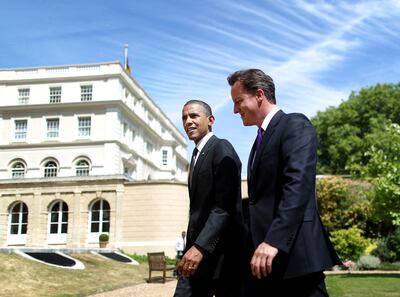
She also argued that his strong ties to Israel could help “find a way to a ceasefire” which was “more urgent than many in the government like to admit”, particularly given “the staggering number of Palestinian deaths”.
“I hope Cameron will have the political willpower and moral courage to do the right thing, not just with words but with actions.”
Key to those actions will be visiting the Palestinian Authority in the occupied West Bank, “given that they are the main players in the wider picture of the region”, said Ms Talabany.
That would need to be followed by an extensive trip around the Gulf states, including the UAE and Saudi Arabia, to build support for a viable postwar peace plan.
In those Middle East travels, argued Mr Gordon-Farleigh, the former prime would add his “incredibly valuable experience of having seen it and done it already” and a “deep understanding of the geopolitical landscape and insights into the complex dynamics of global politics”.
